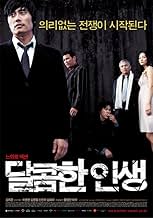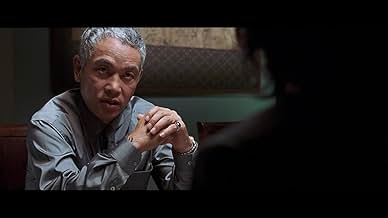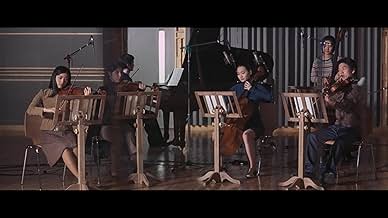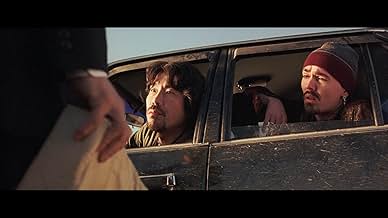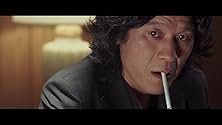ÉVALUATION IMDb
7,5/10
44 k
MA NOTE
Les choses tournent mal pour un caïd lorsqu'il ne suit pas les ordres de son patron.Les choses tournent mal pour un caïd lorsqu'il ne suit pas les ordres de son patron.Les choses tournent mal pour un caïd lorsqu'il ne suit pas les ordres de son patron.
- Prix
- 8 victoires et 14 nominations au total
Kim Yeong-cheol
- Mr. Kang
- (as Kim Young-Chul)
Hwang Jung-min
- President Baek
- (as Jeong-min Hwang)
Kim Roe-ha
- Mun-suk
- (as Roe-ha Kim)
Kim Hae-gon
- Weapon smuggler
- (as Hae-gon Kim)
Eric Moon
- Gun Dealer's Brother
- (as Eric)
Histoire
Le saviez-vous
- AnecdotesThe Korean title "Dalkomhan Insaeng" and the name of the bar "La Dolce Vita" translate to "The Sweet Life". As an ironic touch the International English title is called "A Bittersweet Life".
- GaffesToward the end of the film, when Kim Sun-woo is walking down the corridor searching for his former boss, a guard sitting and reading a newspaper gets up to stop him. Kim Sun-woo shoots him but his gun is not pointed at the guard. Rather, it is clearly pointed at the wall where fake blood appears after the shot like a paint gun.
- Citations
Sun-woo: One late autumn night, the disciple awoke crying. So the master asked the disciple, "Did you have a nightmare?" "No." "Did you have a sad dream?" "No," said the disciple. "I had a sweet dream." "Then why are you crying so sadly?" The disciple wiped his tears away and quietly answered, "Because the dream I had can't come true."
- Générique farfeluAt the end of the credits, the sign above the bar that says "La Dolce Vita" is seen exploding.
- Autres versionsTwo versions of the film exist, the original theatrical version and the director's cut. The director's cut's edits include slight cutting and re-arrangement of scenes, swapping music placement and some additional scenes that do not appear in the original version of the film.
- ConnexionsReferences La dolce vita (1960)
Commentaire en vedette
After Tale of Two Sisters, Ji-woon Kim's new movie has been eagerly anticipated. In his previous film, the marks of originality, intellectual challenge and superb visual style hailed the possibility of a brave new voice in Korean cinema.
A Bittersweet Life commences with similarly awesome photography and ambiance. The wind in the leaves of a tree - Is it the leaves or the wind that moves? asks the disciple of the master. Neither, he replies, it is your mind and heart that moves. Cut to La Dolce Vita, the swish bar restaurant which we are to discover is also the gangland stronghold of Sun-Woo. A single tree in the centre of the restaurant's sky lounge. The colours red and black, glossy and visually forceful in the lounge - they not only play heavily in the film but make any small deviations stand out. Lushness or delicacy is easily conveyed later in the film by colour, a respite to the bloodshed that will almost swamp us. A tinkling piano (Chopin is used as part of the score) adds a delicate counterpoint to what we know will surely be an overload of violence and mayhem.
Sun-Woo has served his boss, President Kang, faithfully for seven years and is now manager of Dolce Vita as well as Kang's right hand man. Background profits, and gang competition, focuses on innocuous little sidelines like the supply of guns or dancing girls, and which countries these should come from. Kang has a secret lover from the 'normal' world, a cellist who is much younger than he, and whom he suspects of infidelity. Kang entrusts Sun-Woo to sort it out and show no mercy. The warfare that follows goes beyond honour, beyond profit, beyond vengeance, . . . beyond any rational point in fact.
Sun-Woo is the ultimate cool bad guy. Indentured to a world of violence and expert in the use of martial arts, knives and guns, he is almost a humanised Bruce Lee who's woken up on a Tarantino set. It sounds almost too good to be true and it is. The story lines are formulaic and derivative, consisting largely of how to engineer more ingenious punch-ups, torture or revenge posturing. Light humour afforded in the contrast between suave topdogs and bumbling henchmen has been done so many times, and many of the entertaining debacles could have been borrowed from Kill Bill. But entertaining it is, on an undemanding level. Sadly it is not the work of the Master that we might have expected from Two Sisters. "The dream I had can't come true," laments the protagonist, and ironically the dreams Ji-woon Kim's fans may justifiably had don't quite come true in A Bittersweet Life, but this otherwise elegant shoot-em-up is still reasonable 'boys night out' night fare.
A Bittersweet Life commences with similarly awesome photography and ambiance. The wind in the leaves of a tree - Is it the leaves or the wind that moves? asks the disciple of the master. Neither, he replies, it is your mind and heart that moves. Cut to La Dolce Vita, the swish bar restaurant which we are to discover is also the gangland stronghold of Sun-Woo. A single tree in the centre of the restaurant's sky lounge. The colours red and black, glossy and visually forceful in the lounge - they not only play heavily in the film but make any small deviations stand out. Lushness or delicacy is easily conveyed later in the film by colour, a respite to the bloodshed that will almost swamp us. A tinkling piano (Chopin is used as part of the score) adds a delicate counterpoint to what we know will surely be an overload of violence and mayhem.
Sun-Woo has served his boss, President Kang, faithfully for seven years and is now manager of Dolce Vita as well as Kang's right hand man. Background profits, and gang competition, focuses on innocuous little sidelines like the supply of guns or dancing girls, and which countries these should come from. Kang has a secret lover from the 'normal' world, a cellist who is much younger than he, and whom he suspects of infidelity. Kang entrusts Sun-Woo to sort it out and show no mercy. The warfare that follows goes beyond honour, beyond profit, beyond vengeance, . . . beyond any rational point in fact.
Sun-Woo is the ultimate cool bad guy. Indentured to a world of violence and expert in the use of martial arts, knives and guns, he is almost a humanised Bruce Lee who's woken up on a Tarantino set. It sounds almost too good to be true and it is. The story lines are formulaic and derivative, consisting largely of how to engineer more ingenious punch-ups, torture or revenge posturing. Light humour afforded in the contrast between suave topdogs and bumbling henchmen has been done so many times, and many of the entertaining debacles could have been borrowed from Kill Bill. But entertaining it is, on an undemanding level. Sadly it is not the work of the Master that we might have expected from Two Sisters. "The dream I had can't come true," laments the protagonist, and ironically the dreams Ji-woon Kim's fans may justifiably had don't quite come true in A Bittersweet Life, but this otherwise elegant shoot-em-up is still reasonable 'boys night out' night fare.
- Chris_Docker
- 19 août 2005
- Lien permanent
Meilleurs choix
Connectez-vous pour évaluer et surveiller les recommandations personnalisées
Détails
Box-office
- Brut – à l'échelle mondiale
- 10 080 808 $ US
- Durée1 heure 59 minutes
- Couleur
- Mixage
- Rapport de forme
- 2.35 : 1
Contribuer à cette page
Suggérer une modification ou ajouter du contenu manquant

Lacune principale
By what name was Dalkomhan insaeng (2005) officially released in Canada in French?
Répondre
